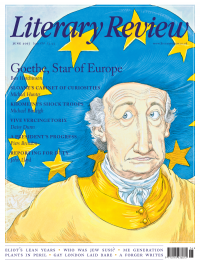Jad Adams
Funeral Parlance
Past Mortems: Life and Death Behind Mortuary Doors
By Carla Valentine
Sphere 287pp £12.99
When she was a child, Carla Valentine used to wonder what it felt like to be a corpse. She would direct her friends to take part in funerals for roadkill they found. While her contemporaries went off to learn languages or travel in Southeast Asia, Valentine spent her gap year assisting an embalmer. As a student she volunteered part-time at the local mortuary, learning the correct etiquette for holding organs removed from a cadaver.
Valentine has worked in hospitals, civic mortuaries and, latterly, as curator of the St Bartholomew’s Hospital Pathology Museum and as an adviser on films. This book is ‘my life in death’. It forms part of a growing trend of books and television programmes about the facts of death, though none, I think, is quite as visceral as this.
Valentine approaches the unzipping of a newly arrived body bag like a child opening a Christmas present. Will it be an anorexic dentist with infected bedsores? Will it be a cross-dressing bruiser in a tight pink lace ensemble? Or will it be a disappointment – just a flood of brown liquid flowing out onto the clean mortuary floor?
She shows great sympathy for the dead: dressing the wounds, cutting the nails and combing the hair of a corpse no relatives will ever come to see. She feels that both sex and death are ‘horizontal’ mysteries. Consequently, tales from her own lovelife intersperse the story of her career, which saw her rise to the rank of senior anatomical pathology technologist. As she was on the Forensic Response Team emergency alerts list for multiple deaths, on the day of the terrorist bombings in London in July 2005 she was summoned to work in the temporary mortuary that had been set up. For Valentine, becoming involved in a mass fatality investigation was ‘something akin to being called into a religious order’. She had attended courses on disaster response and now she was doing the real thing, conducting a forensic postmortem on each victim, recovering shrapnel and pieces of the bomb that could be valuable to that investigation from the corpses, and collecting tiny fragments of bodies in bags.
One reason for writing this book was to break the silence surrounding the mortuary fostered by technicians who create their own ‘taboo on the dead’ by keeping the profession ‘shrouded in secrecy’, but being open about death has brought its own challenges. When Valentine appeared on a television programme, family and friends gathered round to see what she did at work. There she was on the small screen: ‘me, tiny and blonde with a huge pair of silver rib shears, cracking my way through a man’s rib cage, the tough bones making the most awful noises in the echoey post-mortem suite.’ Her friends were aghast: ‘I thought you put make-up on them,’ one said.
There is a good scattering of ancient lore in the book, about such things as Egyptian embalming and about her hero, the anatomist Andreas Vesalius. Even the theatre gets a look-in, as Valentine criticises the speech by Salome to the head of John the Baptist in Oscar Wilde’s play. A young woman would not have had the upper body strength to keep holding a human head in front of her face long enough to have a lengthy conversation with it, says Valentine, who has indeed held a decapitated head. Not a lot of literary critics have done that.
Past Mortems is breezily written in a conversational style, full of the history of dissection and forensic anecdotes and with plentiful figures of speech involving food. Valentine describes, for instance, how the skin of the deceased flakes off like the pastry of a croissant, and how dropped maggots pop like Rice Krispies under her feet. Sometimes real life intrudes too closely for comfort: the chapter on dead babies starts with picking the right size of cardboard coffin for a pauper funeral and culminates in Valentine’s own miscarriage. By and large, this book is written with cheery humour and pathos, but every so often it draws us up with a shock. A bit like death, really.

Sign Up to our newsletter
Receive free articles, highlights from the archive, news, details of prizes, and much more.@Lit_Review
Follow Literary Review on Twitter
Twitter Feed
How to ruin a film - a short guide by @TWHodgkinson:
Thomas W Hodgkinson - There Was No Sorcerer
Thomas W Hodgkinson: There Was No Sorcerer - Box Office Poison: Hollywood’s Story in a Century of Flops by Tim Robey
literaryreview.co.uk
How to ruin a film - a short guide by @TWHodgkinson:
Thomas W Hodgkinson - There Was No Sorcerer
Thomas W Hodgkinson: There Was No Sorcerer - Box Office Poison: Hollywood’s Story in a Century of Flops by Tim Robey
literaryreview.co.uk
Give the gift that lasts all year with a subscription to Literary Review. Save up to 35% on the cover price when you visit us at https://literaryreview.co.uk/subscribe and enter the code 'XMAS24'